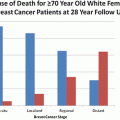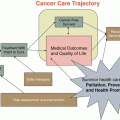Physical and medical challenges
Managing physical symptoms and side effects (e.g., pain, fatigue)
Dealing with constant or changing treatment schedules
Accepting stable disease as a desirable outcome of treatment
Maintaining adequate communication with the medical treatment team
Fearing abandonment by the medical team
Deciding to end curative treatment and accepting palliative care
Psychological challenges
Coping with uncertainty and unpredictability
Perceiving a lack of control
Fearing dependency on others
Progressively losing functional ability
Maintaining valued life goals
Fearing death and suffering
Balancing hope with realistic preparations for the future
Managing complex emotions
Having unmet informational needs
Interpersonal challenges
Communicating with friends and family about illness and death
Feeling socially isolation and lacking emotional or instrumental support
Having concerns for loved ones
Spiritual and existential challenges
Making sense of and accepting the cancer diagnosis in the context of spiritual beliefs
Finding meaning in one’s life and death
Practical concerns
Knowing when and how to seek home help, transportation assistance, or other services
Managing financial and legal affairs
Pain and fatigue are the two most common symptoms experienced by women living with metastatic breast cancer. Pain is often the first symptom of recurrent breast cancer; in women with stage IV disease at diagnosis, it may also be a presenting symptom. Pain can result from the after effects of initial breast cancer surgery and radiation, as well as in association with local recurrence and/or lymphedema. The latter may produce both psychological consequences and physical sequelae, such as arm heaviness and pain. Bone metastases and skeletal events (e.g., fractures) have become less frequent with bisphosphonate therapy; however, women still may suffer from severe pain and limitation of function as a result of bone metastases and nerve entrapment syndromes. Fortunately, skeletal metastases are often very responsive to radiation as well as analgesics, but the chronic and ongoing nature of pain when metastatic disease is in the bones can be burdensome. Similarly, visceral disease (e.g., liver, intra-abdominal or thoracic) can be responsible for substantial pain that is often more challenging to control. Cumulative toxicities from chemotherapy and radiation therapy can also contribute to pain syndromes, such as post-taxane neuropathy and radiation fibrosis and nerve entrapment. Scar tissue can lead to functional limitations and associated pain.
Among the challenges of pain management in women living with metastatic disease is their desire to be alert and functional, and not be dragged down by the sedation of narcotics. Many women continue to work and actively manage their households, and their reluctance to take analgesics on a regular basis may reduce the quality of their pain control. Complementary and alternative medicine (CAM) approaches are used by many women, although systematic and evidence-based data are lacking. Cancer-directed therapies will often relieve pain, e.g., radiation, chemotherapy. CAM therapies may help with management of treatment side effects as well. Because women living with metastatic breast cancer are hopeful for treatment responses, they are highly motivated to find a therapy that will relieve pain as well as prolong life. Some women move through serial treatments and look for experimental opportunities.
Fatigue, which is another serious problem for women living with metastatic breast cancer, is multi-factorial; contributors include the disease itself, treatments, and probably deconditioning from the physical symptoms associated with the disease. Proinflammatory cytokines, frequently elevated in advanced cancer (de Raaf et al. 2012), may be responsible for cancer-related fatigue that can seem out of proportion to the tumor burden. In addition, chemotherapy, radiation, and many of the newer targeted therapies (e.g., everolimus) can contribute to ongoing fatigue (Baselga et al. 2012). Although physical activity may be effective in relieving cancer-related fatigue in patients with less tumor burden, in patients with metastatic disease, some balance of energy conservation and physical activity may be the most appropriate strategy (Howell et al. 2013). CAM therapies such as yoga and Tai chi may be effective, but may have to be done cautiously in the setting of bone metastases.
Clinically significant depression, anxiety, and adjustment disorders are prevalent in adults with advanced cancer (Miovic and Block 2007) and in women with recurrent or metastatic breast cancer specifically (Burgess et al. 2005; Okamura et al. 2000). For example, in a 5-year study of women diagnosed with early-stage breast cancer within 5 months of study entry (Burgess et al. 2005), depression and anxiety diagnosed via interview using standard diagnostic criteria were more prevalent (45 %) in the 3 months following diagnosis of recurrent cancer than after initial breast cancer diagnosis (36 %). Cancer-related distress, in the form of intrusive thoughts and feelings about the disease, also is elevated after diagnosis of recurrent breast cancer (Andersen et al. 2005; Oh et al. 2004). Whereas cancer-specific distress and general quality of life improve over the year after diagnosis, problems with physical symptoms and functioning persist (Yang et al. 2008b). Although very few longitudinal studies are available, attributes associated with poorer psychological adjustment in women with recurrent and metastatic disease (see Table 16.2) include such factors as younger adult age, more severe physical symptoms (e.g., pain, fatigue), low social support, and more coping with the cancer experience through avoidance and less approach-oriented coping (e.g., planning, positive reappraisal; Yang et al. 2008a).
Table 16.2
Factors associated with poor psychological adjustment in the context of metastatic breast cancera
Severe physical symptoms (especially pain) and poor functional status |
Younger age |
Low dispositional optimism |
Low perceived social support |
Suppression of emotional experience or expression |
High coping through avoidance and low coping through approach-oriented strategies |
Certainly, a diagnosis of metastatic breast cancer generates psychological, interpersonal, and physical demands. It appears, however, that most women maintain or recover generally positive psychological health. In addition, adults with advanced cancer report that benefits such as enhanced relationships, deepened spirituality, and strengthened life appreciation and priorities can accompany the experience (Moreno and Stanton 2013).
Care of Women with Metastatic Disease
Women living with metastatic breast cancer have frequent and ongoing contact with the oncology care system. Initial treatment planning should be multidisciplinary, as is recommended for initial diagnosis and treatment (Cardoso et al. 2012). Even when disease is controlled and stable, as with responsive endocrine sensitive cancer, regular visits to the oncologist will occur at least every 2–3 months. Monitoring of disease status will often focus on tumor markers and specific scans, and patients may have need for symptomatic management of disease-related or treatment-related symptoms. Often, women will be able to continue working and do other meaningful activities, but some may have serious fatigue, cognitive difficulties or pain that may make activities difficult.
Living with the uncertainty of how long a specific treatment regimen will provide benefit is one of the critical challenges that the patient and her physician must face. The tempo of the disease recurrence as well as the burden of metastatic disease sites (a few or many; soft tissue vs. visceral) will provide some indication of whether or not complex multi-agent therapy is recommended or single agent serial treatments are appropriate. Increasingly, the approach to metastatic disease (Cardoso et al. 2012) reflects the consensus that palliative and supportive care are essential, and that the patient’s preferences need to be taken into consideration (Table 16.3 from Cardoso). In addition, a recent consensus panel outlined specific strategies for addressing the supportive and palliative care needs of women living with metastatic disease, from a global perspective, with organ-specific approaches (Cleary et al. 2013). However, most of these recommendations are consensus based, with few randomized studies available.
Table 16.3
Guideline statement for management of advanced breast cancer (ABC)a
(1) The management of ABC is complex and, therefore, involvement of all appropriate specialties in a multidisciplinary team (including but not restricted to medical, radiation, surgical oncologists, imaging experts, pathologists, gynecologists, psycho-oncologists, social workers, nurses, and palliative care specialists), is crucial |
(2) From the time of diagnosis of ABC, patients should be offered appropriate psychosocial care, supportive care, and symptom-related interventions as a routine part of their care. The approach must be personalized to meet the needs of the individual patient |
(3) Following a thorough assessment and confirmation of MBC, the potential treatment goals of care should be discussed. Patients should be told that MBC is incurable but treatable, and women can live with MBC for extended periods of time (many years in some circumstances). This conversation should be conducted in accessible language, respecting patient privacy and cultural differences, and whenever possible, written information should be provided |
(4) Patients (and their families, caregivers or support network, if the patient agrees) should be invited to participate in the decision-making process at all times. When possible, patients should be encouraged to be accompanied by persons who can support them and share treatment decisions (e.g. family members, caregivers, support network) |
(5) There are few proven standards of care in ABC management. After appropriate informed consent, inclusion of patients in well-designed, prospective, randomized trials must be a priority whenever such trials are available and the patient is willing to participate |
(6) The medical community is aware of the problems raised by the cost of ABC treatment. Balanced decisions should be made in all instances; patients’ well being, length of life and patient’s preference should always guide decisions |
(7) Validated patient reported outcome measures provide useful information about symptom severity and the burden and the impact of these symptoms on overall quality of life. Systematic collection of such data should be integrated with other clinical assessments and form part of the decision-making about treatment and care |
Compared with efficacious psychosocial interventions tested in randomized controlled trials (RCTs) for adults with early-stage cancer (e.g., Faller et al. 2013), the number of trials for women with metastatic disease is small. Women with metastatic breast cancer often are not included or included in such small numbers in those trials that reliable subgroup analyses are not possible. A recent review and meta-analysis of ten psychological RCTs with 1,378 women diagnosed with metastatic breast cancer included three trials of distinct individual approaches and seven group psychotherapy trials (four supportive-expressive therapy trials and three cognitive-behavioral trials) (Mustafa et al. 2013). Although some trials produced psychological benefit, the meta-analysis did not yield a clear pattern of psychological effects, given that a wide variety of outcome measures and follow-up durations were used. Across three trials, however, supportive-expressive group therapy produced a significant reduction in pain compared to usual care. In addition, there was some evidence of a survival benefit associated with intervention participation at 1 year (six trials) but not at 5 years (four trials) after the interventions.
Stay updated, free articles. Join our Telegram channel

Full access? Get Clinical Tree





